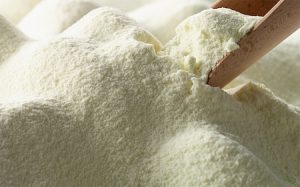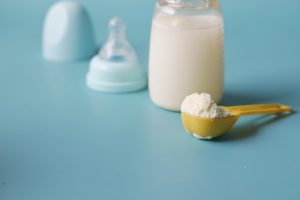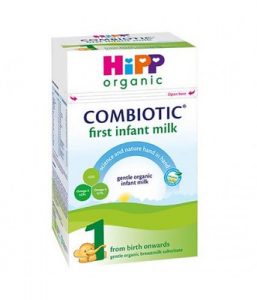The infant formula milk market in Europe is growing and changing rapidly, and so is the demand for new infant formula products. New product launches are also on the rise in the market, which can sometimes lead to confusion about what kinds of infant formula products are available and what they can do for infants. They include fresh ingredients, such as soy protein isolate, calcium caseinate, and hydrolyzed vegetable protein, which have been introduced in EU formulas for meeting the demands of consumers.

Baby Formula From EU
New developments in the EU infant formula market include fresh ingredients such as soy protein isolate, calcium caseinate, and hydrolyzed vegetable protein, which have been introduced on EU formulas to meet the demands of consumers who want more organic formula ingredients while still providing all of the nutrients necessary for healthy development.
In Europe, baby formula is classified as an exceptional food within the EU Regulation 1924/2006 on selling foodstuffs and animal feed. Therefore, it must be prepared with specific ingredients to meet certain nutritional requirements. Continue reading as Family Hype presents you with the best guide to baby formulas manufactured in Europe. Baby products from Europe, including baby formula, are a natural choice for parents seeking the right formula with high quality ingredients; they are specifically designed to have a beneficial nutritional profile without harmful ingredients or added sugars, making them a primary source of nutrition.
Buying Infant Formula From Europe
Baby milk sales and imports from Europe are typically prohibited. This is because it might potentially be dangerous. In addition, the American Academy of Pediatrics (AAP) and the U.S. Department of Agriculture (USDA) both advocated against giving your infant foreign baby formula before the milk crisis.
The AAP and USDA advise families to avoid purchasing imported newborn formula online. Instead, you should look for FDA-regulated infant formula for your babies.
- The FDA does not usually regulate EU infant formulas. However, these formulas sold in the US must adhere to FDA guidelines for quality, labeling, and dietary requirements. Select criteria are being temporarily modified to permit the importation of some EU options during the current milk scarcity. It is difficult to assure the safety of illegally imported or sold products because the FDA has not tested them for these standards, but many have been assessed by EU agencies (EU).
- They may not meet US dietary requirements. The FDA’s nutrient requirements for milk are specifically created to satisfy newborn nutritional requirements. However, studies on EU formulations have revealed that many well-known EU brands may not always include all the specific nutrients listed on their labels. For example, many imported formulas don’t contain as much iron as their American versions. Infants may be at risk for iron deficiency as a result.
- They might be contaminated or inadequately stored. There have been cases of infants becoming ill or dying due to contaminated formula produced outside the United States. Additionally, no assurance illegally imported infant milk has been transported or stored correctly, which could result in infant milk spoilage. Some analysts believe the current milk shortage makes this problem even more of a concern. Frequent infant milk shortages can lead to changes in infant feeding practices that can be harmful to an infant’s health.
- It’s possible that the mixing instructions are not in English. For example, labels and usage instructions for some EU options are not written in English. It may be challenging to comprehend the mixing directions or determine the expiration date if you cannot read the language on the label and instructions.
- Scoop sizes are not uniform. Different-sized scoops are used in various formulations. This can make it more difficult to calculate the amount you need to mix to correspond to the amount of US milk you may have previously given your infant.
Best Brand: Baby Formula From Europe

The rigorous testing standards in the EU make the EU infant formula unique. For example, in Europe, organic infant formulas must comprise at least 30% of their calories from lactose, which may not be required elsewhere. In addition, sucrose is typically banned, save in rare circumstances of premature delivery or allergies.
The formula formulated in Europe, HiPP Dutch Stage 1, is widespread across Europe. Due to its organic composition and richness of nutrients, many experts consider it a gold standard for perfect formula. It’s also liked for its tasty, easy-to-digest recipe. Organic formulas (like most infant formulas) are good in general because they are free from chemicals, hormones, and pesticides. These infant formulas are made from soy or cow’s milk, which comes from grass-fed cows. Grass-fed cows are believed to produce milk with higher nutritional values.
HiPP Organic Combiotic First Baby Formula

It can be administered to newborns exclusively or alongside breastfeeding. In addition, HiPP Dutch Stage 1 babies can readily switch to Stage 2 and Stage 3 formulas as they grow.
This organic milk meets the stringent standard in Europe for organic infant milk because it contains no GMOs. Preservatives, gluten, starch, sucrose, and corn syrup are absent. That is good because studies show that an infant’s milk with corn syrup solids may cause an increase in fussiness and decrease food enjoyment. HiPP Stage 1 consists of organic lactose, vegetable oil, and skim milk. Vitamins, minerals, DHAs, and probiotics help growth and development.
At six months, babies should transfer to HiPP Dutch Stage 2. Like Stage 1, it’s GMO-free and recommended for older babies moving to infant milk. In addition, it may be prescribed for babies who need more breast milk.
HiPP Dutch Stage 2 contains more essential nutrients based on the child’s age and needs. HiPP Stage 2 contains organic skim milk, whey, vegetable lipids, lactose, and vitamins and minerals.
The Stage 2 formula contains omega-3 and 6 fatty acids to help the brain and nervous system develop.
Is It Safe To Buy Milk Formula From Europe Or Baby Formulas?
The short answer is no. One of the foods most strictly controlled in the US is infant milk. EU infant formulas must meet safety criteria governed by congressional legislation to ensure that they include the proper nutrients for an infant’s growth and development. Additionally, to ensure that the products are secure, the U.S. Food and Drug Administration (FDA) keeps track of all formulas and routinely inspects manufacturers. Consumers may not be promptly notified if infant milk is recalled due to a safety concern.
The FDA is looking at approving specially imported formulas from trustworthy suppliers more quickly during the present infant milk scarcity. To guarantee safety, this will be done under strict FDA supervision, which is why there’s no need to worry if you’re planning to buy an imported option to ensure infant nutrition. The European Commission also works with the FDA when it comes to European options
All parents want the best for their growing child. The AAP recommends breast milk as a child’s sole source of nutrition for about the first six months—and continued breastfeeding after starting solid foods for a year or more, as long as the mother and infant desire. FDA-regulated infant option is a healthy alternative for parents who can’t breastfeed or choose not to. If you choose to use one, please speak to your pediatrician so together you can decide what the best and safest option for your child is.
European infant options have been used for decades, and it is made from cow’s milk, skimmed milk, whole milk, or a combination of the three. It is often called “natural” because it does not include synthetic additives such as artificial flavors or colors, avoiding the inclusion of harmful substances.
However, they are not regulated by the US FDA, so selling and buying them is illegal. So it is still better to stick with FDA-approved European infant formula in the meantime.
Frequently Asked Questions (FAQs)
Is EU Baby Formula Better Than Organic Baby Formula?
Why Is It That HiPP Baby Formula Is Not Sold In The US?
The quest for FDA approval for HiPP and Holle has thus far remained unattainable, leaving local US stores devoid of their food offerings. Both American and European regulators hold steadfast to strictly enforcing safety measures and nutritional competence when it comes to baby formula.
Which Infant Formula Is Closest To Breast Milk?
Enfamil Enspire takes center stage as the closest alternative to human milk in the realm of baby Formula. Pricey yet nutritional powerhouses – that’s what sets them apart. With exclusive ingredients straight from colostrum itself; lactoferrin being the star, breastfed babies have found their match. In determining which infant formula stage is closest to breast milk, it’s important to consider formulas free from synthetic chemicals and genetically modified organisms, rich in essential vitamins for a healthy immune system, and designed to provide proper nutrition for healthy growth.
What Is The Best Baby Formula Worldwide?
There are a lot of infant milk options out there, but the best infant formula is something that is the closest to human milk or breast milk. It must be an organic infant formula since organic infant formulas tend to have less potential exposure to pesticides and other synthetic nutrients. It must be approved by formula regulations in Europe if you’re planning to buy infant milk in a European style.
Why Do People Prefer The European Formula?
One reason why some parents prefer EU formulas to typical infant formulas is that European recipes have more milk-based options. Even though a European formula has lesser iron content than foreign formulas like the U.S., the European milk powder has more DHA levels.
Why Are Parents Choosing European Formula?
Some parents are choosing foreign milk powder from European brands because many European formulas have goat’s milk, probiotics, and organic, which are free from GMOs, compared to other formulas. An infant milk powder made from goat’s milk is better because it contains more protein and fat compared to cow’s milk. Parents are choosing European milk powder because it is easily digestible, provides the necessary nutrients for brain development, offers the best nutrition without the risk of pesticide residue, is ideal for those who bottle feed, and comes with a dedicated support team for guidance.
Why Is Holle Not FDA-Approved?
The down-to-earth reality? FDA takes charge of U.S-made items – yet Holle baby formulas hail from Germany, meaning European rules apply. In this case, the European Commission is calling the shots.
Is European Milk Powder Sterile?
Ready-to-feed foreign formulas boast absolute sterility, ensuring not a single germ or bacteria enters the bottle – keeping things comfortably captivating.
What Is Different About EU Baby Formulas?
Disparities in iron content and DHA levels between American and European baby formulas. With higher iron content required by US regulations, it demands 1 milligram per serving; meanwhile, European guidelines mandate a mere 0.2 milligrams. Moreover, greater DHA concentrations are observed in the European counterparts.
Which European Milk Powder Is FDA Approved?
Bobbie Organic Infant Milk powder offers a complete nourishment solution for infants. An FDA-compliant USDA Organic milk-based powder reminiscent of breast milk ensures baby gets well-balanced nutrition without any GMOs. Bobbie leaves no room for corn syrup, palm oil, or maltodextrin – it’s focused on providing the best for every little tummy out there.
What Is The Difference Between The American And EU Infant Milk Powder?
Iron content sets American formulas apart, as they pack more than their EU counterparts. Also noteworthy is the amount of DHA, higher in Europe. While Uncle Sam demands 1 milligram of iron per serving in baby formulas, Europeans ask for just .2 milligrams.
Is FDA Approval Applicable In The EU?
Not exactly, but the EU Commission, EMA, and the USA’s FDA join forces to revolutionize health strategies by streamlining efforts and sharing best practices. United in avoiding duplication for the sake of promoting human and animal well-being.
Last Updated on May 15, 2023 by Nisa Jabajab
DISCLAIMER (IMPORTANT): This information (including all text, images, audio, or other formats on FamilyHype.com) is not intended to be a substitute for informed professional advice, diagnosis, endorsement or treatment. You should not take any action or avoid taking action without consulting a qualified professional. Always seek the advice of your physician or other qualified health provider with any questions about medical conditions. Do not disregard professional medical advice or delay seeking advice or treatment because of something you have read here a FamilyHype.com.